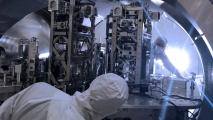To explore space, we first have to finish exploring the moon. And to do that, we need to be able to navigate and travel the moon the way we navigate and travel Earth. That’s Astrobotic’s bread and butter. The Pittsburgh company’s proprietary navigation system allows lunar spacecraft to land within yards—rather than miles—of the intended target. And the goal is to use the tech to offer the world an affordable, routine delivery service to the moon.
Going back to the moon may seem like retreading 20th century history, but as the Astrobotic team points out, we’ve barely scratched its surface. Previous missions to the moon—which has a surface area roughly the size of Australia and Africa combined—were short-lived and limited to small patches of the moon’s surface.
“We need to go back to become a multi-planet species.” – John Thornton, CEO of Astrobotic
“There’s still a lot of mystery there and we need to go back for different reasons this time,” says Astrobotic CEO John Thornton. “We need to go back to stay. We need to go back to push humanity beyond Earth. We need to go back to become a multi-planet species.”





